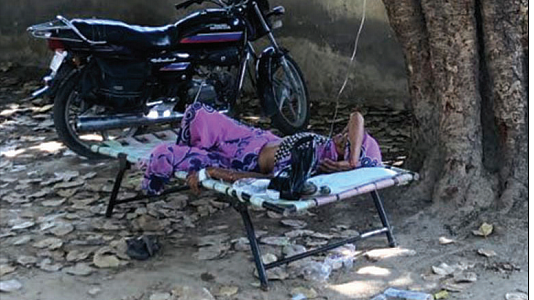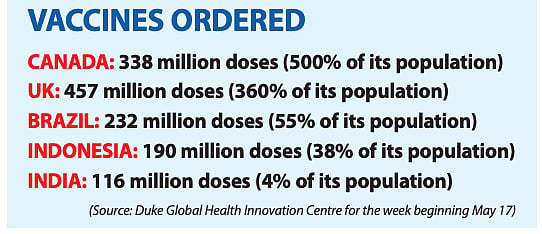Why response to Covid by the Government and government bodies need to be investigated
A drug which the WHO declared had no effect on Covid patients, continues to be prescribed, imported and sold in the black market. But this is not the only reason why an investigation is in order

NM (name changed) was in possession of 100 vials of Remdesivir when Delhi Police arrested him. He was charged with selling the controversial drug at prices ranging from Rs 15,000 to Rs 40,000. He had sourced the drug from Chandigarh, Dwarka and Gurgaon, from where the vials were pilfered. At least five vials he had bore the ‘Made in Bangladesh’ sticker.
Not just Delhi but across the country people have been arrested for selling the drug at a premium. Both Mumbai and Indore Police busted rings selling the drug at exorbitant rates to desperate relatives of patients.

Curiously, even the All India Institute of Medical Sciences (AIIMS), which had recommended the use of Remdesivir, had quietly backtracked last month (see Open Letter).
This week, however, the Government of India announced that domestic production of the ‘essential drug’ for the treatment of Covid-19 had been increased ‘unprecedentedly’ from 38 lakh vials per month to 119 lakh vials per month.
The Department of Pharmaceuticals also announced that 40,000 vials which had been imported commercially had also been distributed to the states and Union Territories as on May 16. In fact 5.26 lakh vials, it confirmed, had also been received by way of ‘foreign aid’.
How many of these vials will eventually find their way to the black market is a question with no answer. Nor is there any explanation why the Government is so keen to increase domestic production of a drug that is said to be ineffective in the treatment of Covid-19. Either the Department of Pharmaceuticals works in an independent silo, does not follow what WHO and AIIMS have been saying and has no coordination with the health ministry, ‘empowered groups’ and task forces—or it is part of a diabolical plan to allow Remdesivir manufacturers to make disproportionate profit.
The plot gets more mysterious because as far back as in November, 2020 WHO had issued the recommendation against the use of Remdesivir in hospitalized patients, regardless of severity. Its advisory on its website was categorical in saying, “there is currently no evidence that Remdesivir improves survival and other outcomes in these patients.”
WHO’s Chief Scientist Dr Soumya Swaminathan and WHO’s Technical Lead on Covid, Dr Maria Van Kerkhove also told India Today TV last week that results from five clinical trials had suggested that the use of Remdesivir “had not helped in reducing mortality or reducing the need for mechanical ventilation among hospitalised patients.”
Why then is the Government so keen to promote Remdesivir and boost production on the pretext of saving Covid-19 patients?
Remdesivir is an expensive drug manufactured by American pharma giant Gilead Life Sciences. And although in the US, a drug is normally approved for use only if it meets the two criteria for safety and efficacy, Remdesivir was granted approval in October, 2020 based on ‘promising data from relatively small trials with about 1000 participants’.It took less than a month for the WHO to rubbish the claim.
In the US, a five-day course of Remdesivir cost around $2600 per person (Rs 1.89 lakh), which explains why manufacturers and middlemen would be keen to sell it. But the Government?
The Remdesivir saga threatens to repeat the ‘Tamiflu fiasco’, which was a costly mistake. Then too the drug Oseltemivir was approved by FDA in the United States, was recommended by the WHO and other regulators while governments went on a buying spree and stockpiled the drug between 2002 and 2009. By the time the drug was found to be not as effective as it was claimed and had serious side effects, the manufacturer had made a killing.
Following reports from various states of ventilators lying unused, the Prime Minister has ordered an immediate audit of installation and operation of the machines in states.
Besides the accusation that the ventilators supplied by the Centre were defective, there are credible reports that the ventilators are lying unused because nobody knows how to operate them. Ventilators, which assist in breathing, can have varying degrees of sophistication. Imported ventilators come with sensors and computer chips and can cost anywhere between Rs two and Rs 25 lakhs. RTI replies indicate that PM CARES funds were used to purchase ventilators which were priced between Rupees one lakh and Rupees eight lakhs from manufacturers, some of whom were encouraged to manufacture the machines for the first time.
In these circumstances, it is clearly not enough to have just an audit. If the PMO were serious, it should have conducted the audit of requirement, feasibility and availability of operators before placing the orders. But it is a year after placing the orders that the PM has woken up to the need for train ing people on how to use ventilators. Since the PMO apparently had no information on the availability of operators, on what basis were the ventilators ordered in the first place? Which companies received the orders and why, on what basis were the ventilators distributed etc. are questions which are likely to be brushed aside by classifying them as emergency purchases and PM CARES fund of course will not be audited.
An inquiry into the government’s Covid response should look at how decisions were taken on vaccines. There is no explanation why states are being encouraged to bid for the same vaccines from the same global suppliers and why the Centre cannot centrally purchase and distribute the vaccines. While this is common sense and would cost less, the government has made the bizarre claim in court that this would not be in public interest. While the Government pats its own back by claiming that it has managed to contain the infection to less than two percent of the population, it contradicts itself by claiming that 70% of the districts have more than 10% ‘positivity’ and that half the villages are affected. It is silent on reports of bodies floating in rivers or buried in the sand. It refuses to admit to community transmission but has nothing to say on reports that crematoriums are overworked and graveyards have run out of space.
Nobody will ever know how many people have died because of hasty or faulty treatment; and what role the regulators played in promoting wrong treatment protocols. Nor will we know how many families became bankrupt because private hospitals were allowed to fleece patients.
The Government, with good reason, would say this is no time for inquiries or finger-pointing. But how else do we learn what to avoid if, God forbid, a third wave were to hit us?
(Views are personal)
Follow us on: Facebook, Twitter, Google News, Instagram
Join our official telegram channel (@nationalherald) and stay updated with the latest headlines
Published: 22 May 2021, 2:08 PM
